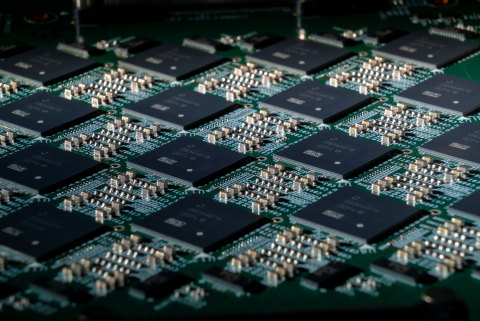SANTA CLARA, Calif. — (BUSINESS WIRE) — October 2, 2020 — What’s New: Today, Intel Federal LLC announced a three-year agreement with Sandia National Laboratories (Sandia) to explore the value of neuromorphic computing for scaled-up computational problems. Sandia will kick off its research using a 50-million neuron Loihi-based system that was delivered to its facility in Albuquerque, New Mexico. This work with Loihi will lay the foundation for the later phase of the collaboration, which is expected to include continued large-scale neuromorphic research on Intel’s upcoming next-generation neuromorphic architecture and the delivery of Intel’s largest neuromorphic research system to date, which could exceed more than 1 billion neurons in computational capacity.
This press release features multimedia. View the full release here: https://www.businesswire.com/news/home/20201002005076/en/

A close-up shot of an Intel Nahuku board, each of which contains 8 to 32 Intel Loihi neuromorphic chips. Intel’s latest neuromorphic system, Pohoiki Beach, is made up of multiple Nahuku boards and contains 64 Loihi chips. Pohoiki Beach was introduced in July 2019. (Credit: Tim Herman/Intel Corporation)
“By applying the high-speed, high-efficiency and adaptive capabilities of neuromorphic computing architecture, Sandia National Labs will explore the acceleration of high-demand and frequently evolving workloads that are increasingly important for our national security. We look forward to a productive collaboration leading to the next generation of neuromorphic tools, algorithms, and systems that can scale to the billion neuron level and beyond.”
–Mike Davies, director of Intel’s Neuromorphic Computing Lab
Why It’s Important: While most neuromorphic research to date has focused on the technology’s promise for edge use cases, new developments show that neuromorphic computing could also provide value for large, complex computational problems that require real-time processing, problem solving, adaptation and learning.
As a leader in neuromorphic research, Intel is actively exploring this potential, recently releasing a 100-million neuron system, Pohoiki Springs, to the Intel Neuromorphic Research Community (INRC). Initial research conducted on Pohoiki Springs demonstrates neuromorphic computing can provide up to four orders of magnitude better energy efficiency for constraint satisfaction – a standard high-performance computing problem – compared to state-of-the-art CPUs.
Building on this promise, Intel will deliver multiple large-scale neuromorphic research systems to Sandia as part of the Department of Energy’s Advanced Scientific Computing Research program, which supports U.S. leadership in supercomputing, high-end computational science and advanced networking for science.
Through the collaboration, Intel and Sandia hope to advance research in scaled-up neuromorphic computing to determine where these systems are most effective and how they can provide real-world value. Additionally, the joint effort should help better understand how emerging technologies, like neuromorphic computing, can be utilized as a tool to address some of the country’s most pressing scientific and engineering challenges. These include problems in scientific computing, counterproliferation, counterterrorism, energy, and national security.
“Sandia National Labs has long been at the leading edge of large-scale computing, using some of the country’s most advanced high-performance computers to further national security. As the need for real-time, dynamic data processing becomes more pressing for this mission, we are exploring entirely new computing paradigms, such as neuromorphic architectures,” said Craig Vineyard, principal member of the Technical Staff at Sandia. “Our work has helped keep Sandia National Labs on the forefront of computing, and this new endeavor with Intel’s Neuromorphic Research Group will continue this legacy into the future.”
What Will be Researched: As a member of the INRC since June 2018, Sandia has explored work related to scientific and numerical computing. Using neuromorphic research systems in house, Sandia plans to expand on this research to evaluate the scaling of a variety of spiking neural network workloads, from physics modeling to graph analytics to large-scale deep networks. These sorts of problems are useful for performing scientific simulations such as modeling particle interactions in fluids, plasmas, and materials. These physics simulations increasingly need to leverage advances in optimization, data science, and advanced machine learning capabilities in order to find solutions. Accordingly, potential applications for these workloads include simulating the behavior of materials, finding patterns and relationships in datasets, and analyzing temporal events from sensor data.
To begin this work, Sandia will run various workloads on a 50-million neuron Loihi-based system and evaluate initial results. As research progresses, Sandia and Intel will collaborate to scale the research to larger and more powerful neuromorphic systems, including systems powered by Intel’s upcoming next-generation neuromorphic research chip. Sandia will also receive Intel’s largest neuromorphic research system to-date, which could exceed more than 1 billion neurons.
More Context: Intel Scales Neuromorphic Research System to 100 Million Neurons | Neuromorphic Computing (Press Kit) | Intel Labs (Press Kit)
About Intel
Intel (Nasdaq: INTC) is an industry leader, creating world-changing technology that enables global progress and enriches lives. Inspired by Moore’s Law, we continuously work to advance the design and manufacturing of semiconductors to help address our customers’ greatest challenges. By embedding intelligence in the cloud, network, edge and every kind of computing device, we unleash the potential of data to transform business and society for the better. To learn more about Intel’s innovations, go to newsroom.intel.com and intel.com.
© Intel Corporation. Intel, the Intel logo and other Intel marks are trademarks of Intel Corporation or its subsidiaries. Other names and brands may be claimed as the property of others.
View source version on businesswire.com: https://www.businesswire.com/news/home/20201002005076/en/
Contact:
Alexa Korkos
415-706-5783
alexa.korkos@intel.com








